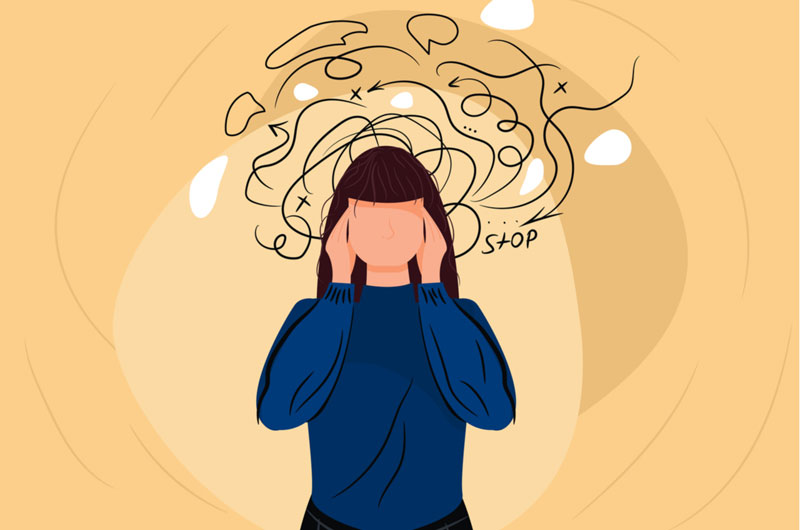Do you ever find yourself stuck with bad or negative thoughts that make you feel overwhelmed or even a bit crazy? If so, you’re not alone. These negative thoughts can be a common experience for many people with Obsessive-Compulsive Disorder (OCD). In our blog, we’re going to look at “what these negative thoughts are like” and how they can affect your day-to-day life. We’ll also share some real examples and talk about “treatments that can help you manage these thoughts better”.”
Contents
Understanding the Connection Between Negative Thoughts and OCD

The relationship between negative thoughts and Obsessive-Compulsive Disorder (OCD) is a critical aspect of understanding the disorder. Here’s how they are interconnected:
- Negative thoughts in OCD are typically intrusive, meaning they enter the mind unexpectedly and are often unwanted or distressing.
- These thoughts can revolve around irrational fears or anxieties, such as fear of contamination, harm coming to loved ones, or making mistakes.
- The negative thoughts in OCD often manifest as obsessions, which are persistent and recurrent thoughts or images that cause distress.
- To relieve the anxiety caused by these obsessions, individuals with OCD may engage in compulsive behaviors, such as excessive cleaning, checking, or seeking reassurance.
- Impact on Mental Health
The constant barrage of negative thoughts can lead to heightened anxiety and stress, and feelings of depression or hopelessness.
In conclusion, understanding the connection between negative thoughts and OCD is vital for effective treatment and management. Recognizing that these thoughts are a symptom of OCD and not a reflection of reality is a crucial step in breaking the cycle of obsessive-compulsive behavior.
Signs Of Negative Thoughts in OCD?
 There are certain symptoms associated with OCD negative thoughts which are:
There are certain symptoms associated with OCD negative thoughts which are:
- Compulsive behaviors: People with OCD may engage in certain rituals or activities as a way to try and reduce the worry associated with their thoughts.
- Unwanted intrusive thoughts: These are persistent and involuntary thoughts that can cause an individual to become distressed and anxious.
- Repetitive mental checking: This involves re-checking one’s own behavior or the environment over and over again in order to make sure nothing bad has happened or will happen in the future.
- Anxiety: OCD can cause a person to experience intense and excessive worry, even when there is no real threat present. This may lead to feelings of fear, panic, or even depression. Fear of being responsible for something bad happening to oneself or another person.
Take Our Comprehensive OCD Self-Assessment Test
Do you frequently think about those recurring thoughts or feel compelled to perform specific routines and rituals? If these experiences sound familiar, you might be wondering, ‘Do I have OCD?‘
To help you in this journey of self-discovery, we’ve developed a comprehensive assessment to help you self-assess your symptoms and gain a clearer understanding of whether they align with OCD.
Test Yourself👉👉 OCD Test Online
Examples of Negative Thoughts in OCD
 Negative thoughts in OCD are often specific to the individual’s fears and anxieties. However, there are common themes that many people with OCD experience. Here are some examples:
Negative thoughts in OCD are often specific to the individual’s fears and anxieties. However, there are common themes that many people with OCD experience. Here are some examples:
- Contamination Fears:
- “If I touch this doorknob, I will be contaminated with germs and get sick.”
- “I must have touched something dirty, and now I’ll infect my family.”
- Harm-Related Thoughts:
- “What if I lose control and harm my pet or a loved one?”
- “I might have left the stove on, and it could cause a fire and hurt someone.”
- Symmetry and Orderliness:
- “Everything on my desk must be perfectly aligned, or something bad will happen.”
- “If I don’t arrange my books in the right order, I’ll have a terrible day.”
- Religious or Moral Obsessions:
- “Having this bad thought means I’m a sinful person.”
- “If I don’t pray exactly right, something bad will happen to me or my family.”
- Fear of Illness or Death:
- “I feel a slight headache; it must be a serious illness.”
- “What if I have a disease and don’t know it, and it’s too late when I find out?”
- Sexual or Relationship Thoughts:
- “What if I’m not really in love with my partner?”
- “I saw someone attractive; does that mean I’m unfaithful?”
- Fear of Making Mistakes:
- “If I don’t check my work repeatedly, I’ll make a mistake and get fired.”
- “What if I said something wrong in the email and offend someone?”
These examples illustrate how OCD can manifest as various negative thoughts, causing significant distress and leading to compulsive behaviors as a form of coping. Recognizing these as symptoms of OCD rather than truths is a crucial step in managing the disorder.
How Can You Stop These Negative OCD Thoughts?

Stopping negative OCD thoughts involves a combination of therapeutic strategies and self-help techniques. Here’s how you can work towards managing and reducing these intrusive thoughts:
- Mindfulness and Meditation
Practice mindfulness to keep yourself grounded in the present moment, reducing the impact of intrusive thoughts.
Learn to accept the presence of these thoughts without judgment and without responding with compulsions. - Develop a Support System
Share your experiences with trusted friends, family, or support groups.
Regularly consult with a mental health professional for guidance and support. Best Therapist For OCD Help - Self-Care and Healthy Habits
Engage in activities that reduce stress, such as exercise, hobbies, or relaxation techniques.
Maintain a regular schedule for sleep, meals, and exercise to help manage OCD symptoms. - Medication
In some cases, medications like SSRIs can be prescribed to help manage OCD symptoms. Always consult with a healthcare professional for advice on medication. - Limit Avoidance
Avoiding things that trigger your OCD can reinforce the fear. Gently confront these fears in a controlled manner as part of your therapy.
Therapy To Stop Those Repeated Negative Thoughts
Therapy can be a significant aid in overcoming intrusive negative thoughts, especially with techniques like Cognitive-Behavioral Therapy (CBT) and Exposure and Response Prevention (ERP). Here’s how a therapist can guide you through these therapies:
Cognitive-Behavioral Therapy (CBT)
- Working with a Therapist: In CBT, you’ll work with a therapist to identify and understand your specific patterns of negative thinking. For example, if you constantly fear making mistakes, your therapist will help you recognize how this thought pattern affects your behavior and emotions.
- Challenging and Reframing Thoughts: Your therapist will guide you in challenging these irrational beliefs and teach you to reframe your thoughts more realistically and positively. For instance, learning to replace the thought, “If I make a mistake, it will be catastrophic,” with, “Everyone makes mistakes, and I can learn from them.”
- Practical Application: CBT involves practical exercises, like keeping thought diaries, to apply what you learn in therapy to daily life situations.
- Outcome: The goal is to decrease the anxiety and distress caused by negative thoughts, giving you a more balanced and rational perspective.
Exposure and Response Prevention (ERP)

- Trusted Source Treatment: ERP is a first-line treatment for OCD, focusing on breaking the cycle of obsessive thoughts and compulsive actions.
- Controlled Exposure: In ERP, your therapist will help you confront the thoughts, images, objects, or situations that trigger your OCD. For example, if you have contamination fears, you might start by touching something you perceive as dirty, under the guidance of your therapist.
- Response Prevention: Following the exposure, you’ll be taught to refrain from engaging in your usual compulsive behaviors. Instead, you’ll learn to tolerate the anxiety and discomfort until it naturally lessens.
- Gradual Progression: This process is gradual and done at a pace you can handle, slowly building up your tolerance and reducing the power of negative thoughts over time.
Both CBT and ERP are collaborative processes, where the therapist provides support, guidance, and expertise, but the individual plays an active role in their recovery. By working through these therapies, individuals can gain significant control over their negative thoughts and OCD symptoms.
Conclusion
Obsessive negative thoughts are a common symptom of OCD, and these intrusive and distressing thoughts can have a significant impact on daily functioning. It is important to understand that there are several treatment options available for those who wish to manage their OCD symptoms, including cognitive-behavioral therapy (CBT) and medication. It is also recommended that lifestyle changes such as stress reduction, exercise, and meditation be incorporated into treatment plans to reduce the risk of relapse.
Consider a professional to help you manage your OCD and create a coping plan that works for you. With the right help and support, it is possible to take back control of your thoughts and lead a more fulfilling life.
For more information and guidance, please contact MantraCare. OCD is a mental health disorder characterized by obsessions and compulsions. If you have any queries regarding Online OCD Counseling experienced therapists at MantraCare can help: Book a trial OCD therapy session



